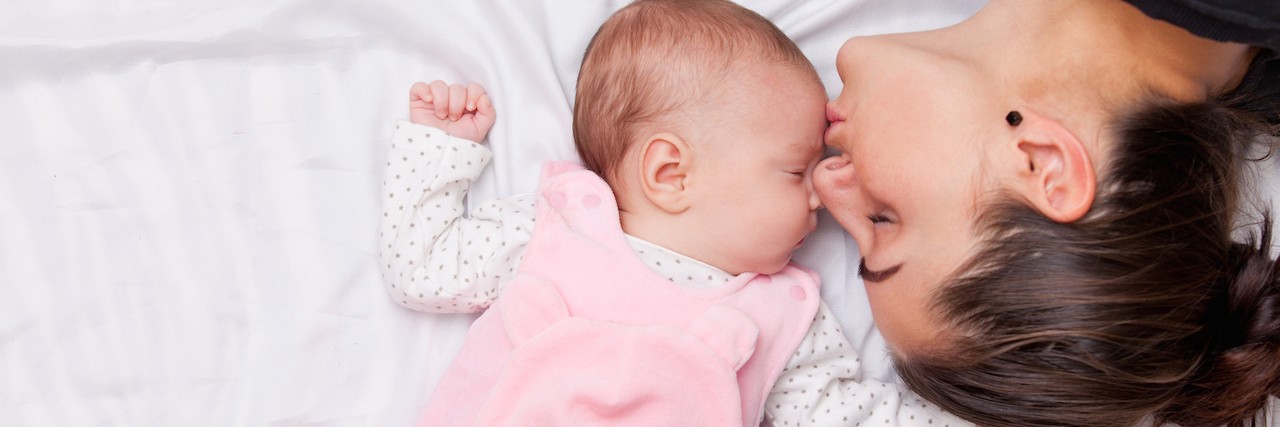As I stared at the footprint my slipper had left on the bedroom wall months earlier, then down at my daughter, I knew it was time to ask for help.
The footprint had appeared after an unfortunate incident involving a stockpot full of sauce and meatballs, which had been seasoned with a generous helping of glass shards from a shattered lid. When the lid shattered an hour before the family Christmas party, which I had offered to host six weeks after giving birth, I began flying through my home. I threw my slippers in a blind fury as I grabbed my purse and car keys to run to the store. My husband stood wide-eyed holding our daughter as I left the house, flinging curse words in a bitter tirade that could only be described as “sailor-esque.”
The feelings had started a few months into my pregnancy. Exhausted from throwing up and growing a human, I began to realize how much I didn’t enjoy being pregnant. I hated the thoughtless comments and the unsolicited attention. I missed waking up without feeling sick and sitting down without falling asleep. I hated people telling me I needed to be careful, whether I was taking the dog for a walk or standing on a step stool. I felt terribly lonely and ashamed because I didn’t want to celebrate my pregnancy with the rest of the world. Instead, I wanted to crawl in a hole until my daughter was born.
At the time, I had heard of postpartum depression, but since I was still pregnant, I assumed something was wrong with me. I thought I was just being selfish and self-absorbed. I have friends who have miscarried and those for whom getting pregnant took years of doctor appointments, money and emotional exhaustion. Others have had to face the pain of finding out they will not be able to bear children. How could I ever complain?
I had no idea there was something called antenatal depression, which occurs during pregnancy and shares many of the same symptoms associated with postpartum depression. Instead, I faked the smiles in public. Then, at home, I frequently sobbed and had daily anxiety attacks to the point where I felt like I couldn’t breathe. I was so stressed out that I developed shingles. I couldn’t imagine my daughter being brought into the world with a worse excuse for a mother.
Therein lies the dichotomy of pregnancy. For those of us who don’t experience the legendary “pregnancy glow,” we feel that we must put on some metaphorical bronzer and glow just the same.
After giving birth, my emotional state became more fragile, but I chalked it up to normal post-baby life. It wasn’t until an early morning in March when, covered in baby vomit, holding a crying child and trying to answer work emails, I felt the emotional bottom fall out of me. I sat on my bedroom floor and wept, staring at the footprint on the wall. I looked down at my daughter, and then I made the best decision I could have made.
I called my doctor.
As I tried to hold back tears, she gently asked me how soon I could come in. When I arrived at my appointment the next day, I explained how I was feeling. I told her that I knew something needed to change, but I didn’t know if medication was right for me. Her response immediately made me wish I had sought help months earlier:
“You are so strong. I know that because you have made it this far without giving up. But what is your quality of life like right now?”
She encouraged me to see a therapist and put me on a low dose of anti-anxiety medication, with the promise I didn’t need to take it forever. Slowly, over the next several months, I began to crawl out of my hole. I began to understand as a new mom, one of the best decisions I could make was to take care of myself. Sacrificing my own well-being in an effort to try to appear “normal” was hurting me, and it was hurting my family.
So to the mamas-to-be who feel you need to be silent about your struggles because otherwise, it means you are ungrateful, I hear you. You are not a monster because pregnancy is difficult for you, even though you have no visible complications. You are still worthy of having a child. You will still be a wonderful, loving parent, but you don’t have to “tough it out” and pretend to be happy.
Ask for help. Find a therapist. Talk to your doctor about what you need to do to take care of yourself mentally and emotionally during pregnancy, not just about what you should be doing physically. Put words to your feelings and share them with your close friends and family. You do not have to walk through this alone.
This post originally appeared on The Huffington Post.

